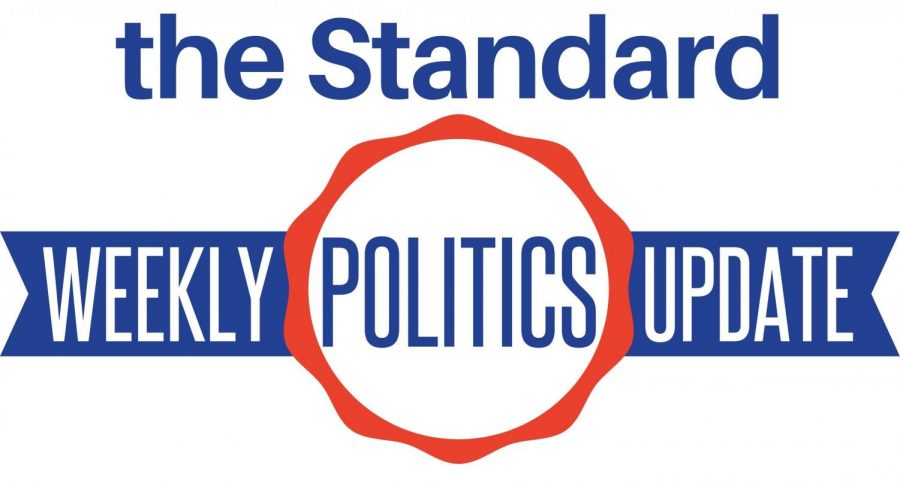Biden sweeps Mini Tuesday primaries
The results of the Michigan Democratic primary further tightened Former Vice President Joe Biden’s grip on the Democratic nomination for president. Biden won by nearly 20 points, dwarfing Senator Bernie Sanders’ mere 36%. This stretches his delegate lead to 881 to Sanders’ 725.
Biden’s victory comes after his unprecedented resurgence on Super Tuesday, in which he won all but three of the 14 states up for grabs. Biden’s unexpected victories in Massachusetts and Minnesota were particularly shocking, as he had trailed Sanders in polling up until election day.
However, one must look beyond just the victory margin to fully understand the reasoning behind them. Exit polling results reveal the true extent of his command on the primary.
Biden won with both men and women. He won with both whites and people of color. On every level of education, Biden won, even those who were non-college educated – a demographic he had struggled to make inroads with –at least up until this point. He even tied Sanders with voters who considered themselves to be “liberal,” despite the fact Biden is a moderate candidate.
The former Vice President’s support amongst African-Americans is unscathed, having won nearly 70% of the electorate in Michigan. This will certainly be boosted by the recent endorsements of Kamala Harris and Cory Booker, the only two black Democratic senators.
Biden’s resurgence over the past two weeks is also the result of an ever-consolidating field of candidates. Those who had run on moderate policy platforms, similar to that of Biden’s, such as Former South Bend, Indiana Mayor Pete Buttigieg and Senator Amy Klobuchar, caved to increasing pressure to drop out of the race, amidst their poor performances in Nevada and South Carolina. Each of them promptly endorsed Biden, giving him the crucial support he needed to resurrect a campaign that had faced lingering questions over its viability.
Nevertheless, Biden looks on course to take the Democratic nomination, with contests over the next couple of weeks looking increasingly in his favor. He is the frontrunner; this race is only his to lose.
Former Vice President to choose a veep of his own
After a slew of states voted March 10, boosting Former Vice President Joe Biden’s campaign and effectively ending that of Senator Bernie Sanders, Biden’s campaign team will no doubt begin to consider who will be his running mate.
Traditionally, Vice Presidential nominees have fit a number of criteria: they traditionally hail from swing states to help their party’s campaign win key electoral votes in the general election; they are generally national political figures with generally lower name recognition; and, they tend to balance the ticket geographically and demographically.
Case in point: when then-Senator Barack Obama chose Biden as his running mate in 2008, Obama was a younger African-American man from the midwest with little political experience while Biden was a long-serving, older white senator from the northeast. Similarly, when Hillary Clinton chose Senator Tim Kaine in 2016, Kaine was male and came from the swing state of Virginia, which Clinton eventually won, demonstrating the value a vice-presidential candidate can bring to a campaign.
However, Biden’s vice president must also be far better-known and more qualified for the presidency than any other vice president in recent history, simply because Biden is 77 years old and would be 78 at the time of the 2021 inauguration. The life expectancy of men in the U.S. is 76.
As such, unlike most of his predecessors, Biden has an increased risk of health issues that could, at times, require him to step back from the presidency and ask his vice president to run the country. President Dwight Eisenhower, who was in his 60s during his presidency and, at the time, was considered old for the job, faced several health episodes that required then-Vice President Richard Nixon to lead his government for weeks at a time.
Furthermore, Biden would be 81 years old in 2024, when he could choose to run for re-election. Simply put, his advanced age would essentially bar him from being a serious candidate, thus making his vice president the presumptive nominee and future president. Therefore, when his campaign picks a running mate, they are not only picking a vice president who could step into the presidency from time to time, but also someone who would be expected to become president themselves and be the embodiment of Biden’s vision and legacy.
Given the heightened importance of the vice presidency under a prospective President Biden, his campaign may choose to forgo the political benefits of a running mate, such as adding key states and demographics to the ticket, in place of picking a well-known, qualified candidate who could easily step into the presidency and replace Biden four years later.
Senators Kamala Harris and Amy Klobuchar, both of whom ran for president this year, are by far and away the most likely picks for the role.
Harris is a family friend of the Bidens and a strong debater, who, in her decades-long career in politics as California Attorney General and a senator, has demonstrated that she is ready to be president. She is also an African-American, Asian-American, only 55 years old and a woman, adding a great deal of diversity in all demographics to the ticket.
Meanwhile, Klobuchar has served in the U.S. Senate for 13 years, embodies Biden’s moderate vision and performed quite well in the New Hampshire primary. As a woman and 59-year-old, she brings some diversity to the ticket in gender and age; coming from Minnesota, she would also deliver a critical swing state for Biden. Klobuchar also has an ace up her sleeve: her endorsement of Biden a day before Super Tuesday almost certainly won him the Minnesota primary (which he was not expected to win) and boosted him in a plethora of other states. If Biden wins the nomination, he owes much of that to her.
Both Harris and Klobuchar also reflect Biden’s moderate, compromise-oriented approach to politics while being major figures in the party and well-known nationally. Both of them have the profile necessary to be a vice president and a president who can continue Biden’s vision for America.
Many other names have also been floated as Biden’s Vice President. Michigan Governor Gretchen Whitmer, for example, helped deliver the Michigan primary for Biden, is a moderate, younger, female governor and comes from a crucial swing state. She is also surely on Biden’s shortlist.
Senators Cory Booker and Elizabeth Warren have also been floated as vice presidents for Biden; Booker, however, is male and does not come from a swing state, while Warren is older, from a solidly-Democratic state, and has not even endorsed Biden, making her a poor choice (in terms of age and ideology) to replace Biden in 2024.
2018 Georgia gubernatorial nominee Stacey Abrams has also been mentioned as a prospective running mate for Biden, given that she is progressive, an African-American woman and a well-known figure nationally. Abrams, however, has not yet endorsed Biden and also has minimal experience in governing (the highest office she ever achieved was Georgia State House Minority Leader). It is unclear that she could effectively manage the presidency or that she would adequately represent and execute Biden’s vision for the country.
While Biden’s vice-presidential pick is no doubt extremely important, especially given his age, it is important to keep three things in perspective. First, there is no guarantee that Biden will even be the nominee, even though there is no clear path for Sanders at this point. Some kind of scandal or health scare (possibly relating to the coronavirus which has now infected over 1000 people in the U.S.) may force Biden or Sanders to withdraw from the race. Even if he wins the nomination, Biden will also have to beat Trump, an incumbent president, for his vice presidential pick to have any meaning, which is a tall order. Then, if Biden were to win, he would still be president for four years before his vice president picks up the mantle, giving them time to acclimate themselves to the responsibilities of the White House.
What is clear is that the path to the general election this November, though made shorter by Biden’s decisive wins over the past week, is still a long one with much room for unexpected changes.
Coronavirus infects global politics
While the coronavirus has upended the functioning of society around much of the world, it also stands to have several different impacts on U.S. and global politics.
Policy-wise, the coronavirus outbreak will continue to incentivize governments to increase spending to contain the virus, expand the quantity of healthcare services available and to keep the economy stable. Already, the U.S. Federal Reserve has cut interest rates significantly, indicating the dire state of the global economy because of the outbreak. Governments are also likely to assert more authoritarian powers to adequately deal with the emergency, using military resources, government allocation of health services and necessities to maintain order in their countries.
The coronavirus has also infected several global government officials, including leaders in Brazil and Iran. Meanwhile, a U.K. junior health minister has contracted the virus, and several U.S. members of congress are in self-isolation after coming into contact with an infected person at the annual CPAC conference of American conservatives. This group of lawmakers notably includes former 2016 presidential candidate Republican Senator Ted Cruz and Republican Representative Matt Gaetz, who wore a gas mask onto the House floor as a symbolic statement just days before he went into self-quarantine.
The coronavirus also stands to alter the state of the 2020 U.S. Presidential Election dramatically. In exit polling, voters have expressed that Former Vice President Joe Biden is the candidate best prepared to manage the effects of the virus as president given his extensive government experience, thus boosting his campaign. Since winning the Michigan primary and unofficially becoming the presumptive nominee, Biden has attempted to portray himself as a statesman capable of handling emergencies. Biden delivered an address on how he would handle the coronavirus that was described by pundits as presidential, demonstrating his campaign’s intention to capitalize on Biden’s experience amid a national crisis.
Trump’s handling of the coronavirus also stands to be a major political point during the general election. Specifically, the government’s slow response to the disease stands to paint Trump as an incompetent executive, especially given that he does not appear to be taking the outbreak seriously. Indeed, Trump has commented on the quality of the TV show “Fox and Friends” when meeting with CDC leaders and claimed that he has scientific knowledge because his uncle was a professor at MIT. While many Americans will overlook these statements, it is certainly a bad look for the president in the middle of a nationwide epidemic and an election in which his opponent appears poised, serious and experienced.
The coronavirus also stands to bring increased attention to the vice presidency, not least because Vice President Mike Pence is leading the charge in containing the outbreak. Rather, as all three major candidates for president, Trump, Biden and Senator Bernie Sanders, are over the age of 70, they would all fall into the “at-risk” category for contracting the virus’ most severe symptoms. As such, candidates will surely consider nominating experienced, younger politicians for vice president to assure the public that, in the unlikely event that they were to be indisposed as a result of the virus, they would have a qualified and healthy replacement standing by.
Popular governor enters race for Senate
While both the media and the public have primarily focused on the Presidential election later this year, down-ballot elections for crucial seats in the Senate have drawn increasing attention over the past week or so.
This is helped not least by former Montana Governor Steve Bullock’s announcement that he is running for the states contested Senate seat this November. The surprise reversal comes after Bullock expressed an initial reluctance to do so, after dropping out of the Democratic primary for president late last year. He will face Republican incumbent Steve Daines, who is well-funded and has the support of President Trump.
Though Montana has been, and continues to be, a Republican stronghold (Trump won by 20+ points in 2016), the state is nonetheless uniquely suited to Bullock’s strengths in this race.
For one, he was extremely popular throughout his two terms as governor of the state. His policy platform, largely based on issues of job creation and small business development, appealed to the conservative demographics of the state, who elected him by over 87% of the vote in 2012. Bullock also presided over Republican majorities in both houses of the state congress, who made his job exceedingly difficult throughout his first term. Despite this, approaching his re-election bid in 2016, he held a 66% approval rating – the fourth highest of any governor in the country.
Beyond just Bullock, Montana voters have shown a tendency to look beyond party lines when it comes to the election of their senators. Despite voting for Trump two years earlier, Montanans voted to re-elect Jon Tester, the incumbent Democratic senator.
Bullock’s entry into the race will also serve to boost democratic chances of retaking the upper chamber. Montana now joins North Carolina, Arizona, and Colorado as states in which Republican incumbents are looking increasingly vulnerable, as democratic challengers in each of those contests are accumulating ever-increasing momentum.






